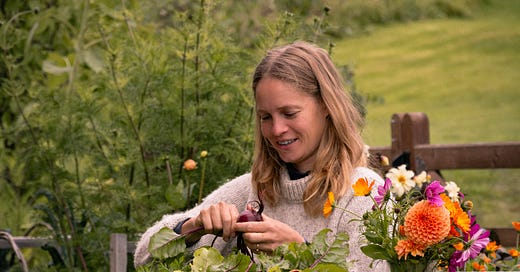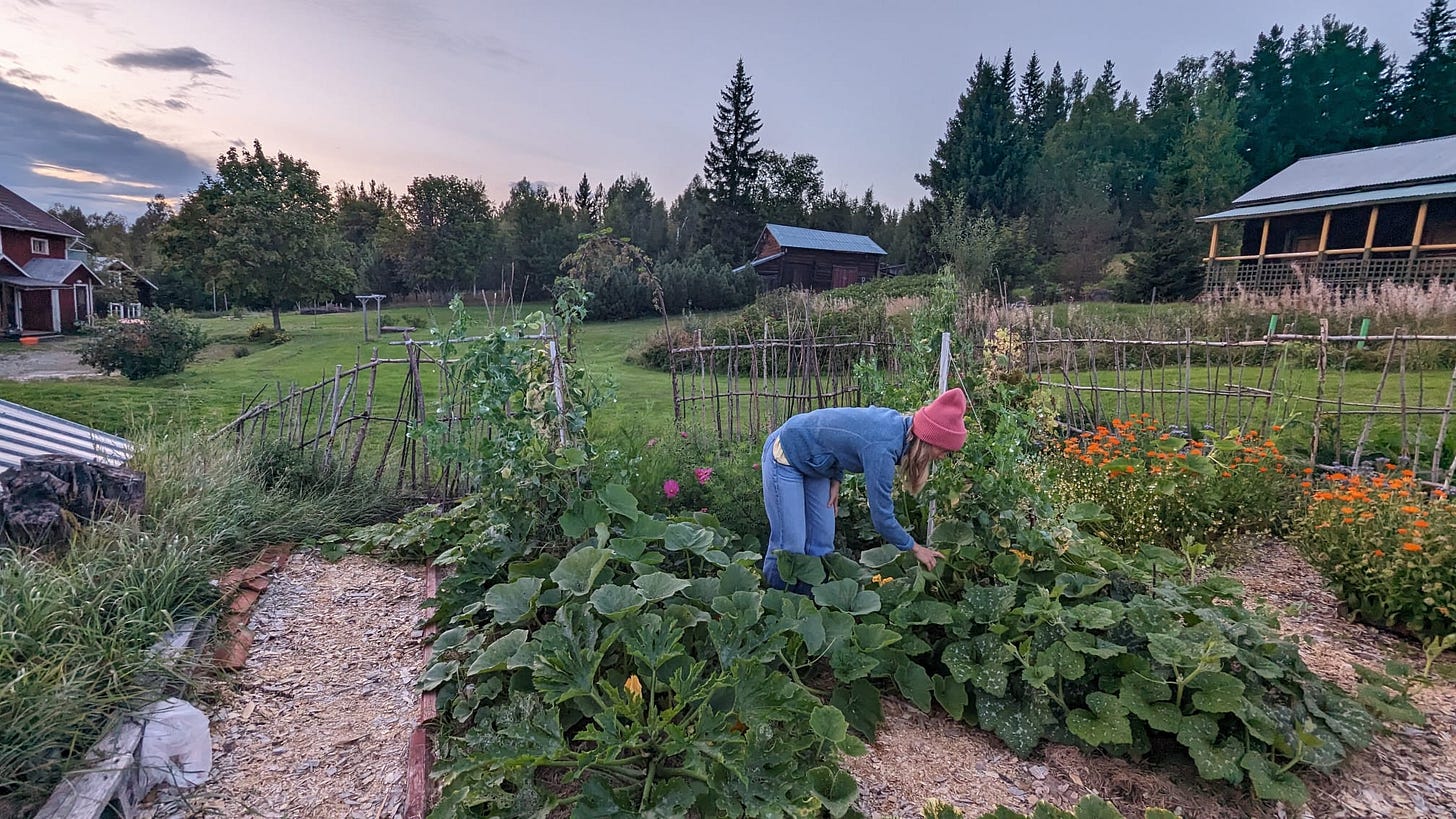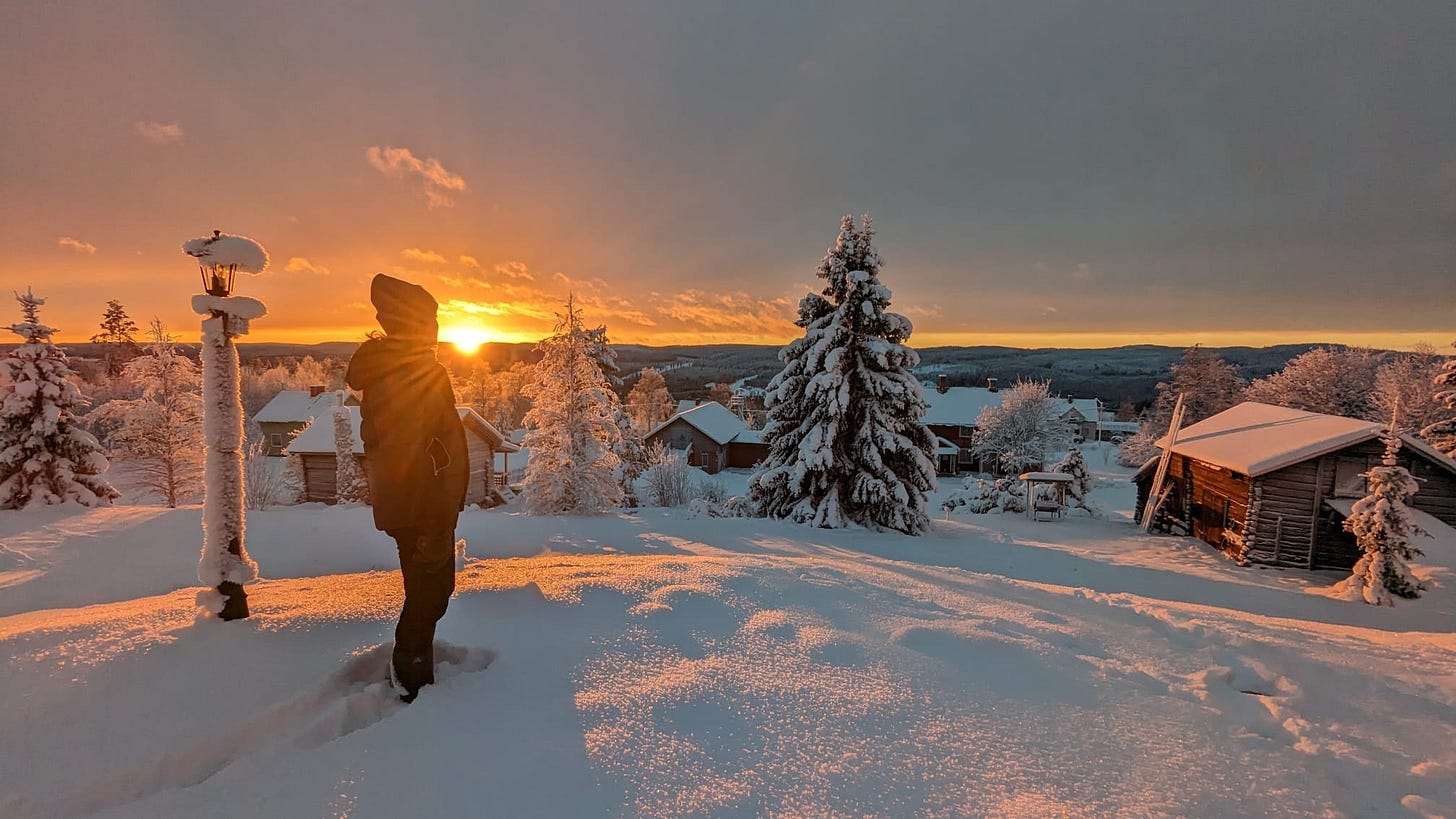Finding space for all parts of ourselves with Caroline de Jong
"My life is diverse because I am diverse, and I now know that these different aspects of me and my life don’t have to rule each other out. "
This interview is part of a new series of conversations with beautiful, courageous people who are building authentic and meaningful lives for themselves. Lives that are truly theirs and that make their hearts and souls sing, even though it might not always be the easy path. This first conversation is with a dear friend of mine, Caroline de Jong. After a career as a lawyer at one of the big firms in Amsterdam, which burnt her out, she took a leap and moved to Sweden. Together with her man, she now splits her time between Stockholm and a tiny village between the lakes and forests, where they both combine a corporate job with renovating an old farm and tending to the land.
Caroline: When you asked me for this conversation, my first thought was that my life isn’t all that different from others, and I think that’s a good thing. It means I didn’t build my life just because I wanted it to be different but because it’s what naturally flowed for me. However, I did make some conscious decisions to distance myself from what I thought was ‘normal’ in life or what I thought life ‘should look like’. I grew up in a pretty standard nuclear family where there was always enough of everything, in an environment and friend group where money was never even a topic, and success was defined by your father’s job title and later on your own. It took courage to give all that up and say: I’ve experienced what life as a hot-shot lawyer in a big city is like, and too many parts make me feel out of place. Because I grew up in such an environment, I can easily manage myself in the conversations, the expectations, and the perfect picture. It is a world I can relate to, but it also comes with a lot of unrest broiling beneath the surface for me. When I would talk about what’s important to me, people didn’t really understand what I was saying, or I would get no response. As my friends and colleagues could not relate to what I was talking about, I felt more and more like an outsider. It made me feel completely overwhelmed by life and totally disjointed. When these feelings eventually led to physical symptoms, it became clear to me that the direction I was going in triggered my alarm system so much that I couldn’t go on with it. That’s when I started to get to know this other side of me that I hadn’t been able to express for so long. The side of me that loves being outside and that longs for a slower pace of life. Step by step, I started to give this side of me more space. Fast forward 7 years, and that’s how my man and I eventually decided to buy a place in the countryside: to discover life outside of the city but mainly to discover more of these sides of ourselves.
Lieke: How did you find out about this other part of yourself, and when did you decide it was time to give it more space and attention?
Caroline: I hate to get into clichés, but at the same time, it is the reality. When I burnt out 7 or 8 years ago, I was forced to drop all the balls I was juggling and the mask and armour I’d been wearing for so long. It was the first moment in my life that I came to a complete standstill and was forced to make some elemental choices. I had to ask myself: if I have the energy to do something for one hour a day, what do I want to do with that hour? I needed to be much more selective with my time and energy. I had to find out which people and activities gave me energy and which drained me. In the beginning, I had no idea, which was incredibly frustrating, but step by step, I noticed what things I enjoyed and what made me happy during a very unhappy time. This period in my life made me realise that for a very long time, I did things on auto-pilot or because it was what I thought society expected from me. I discovered that the outcomes would be very different when I would make my own decisions based on whether things cost or give me energy. Things like a knot in my stomach when I even thought about returning to the office or answering a message from that friend became essential signposts. When the speed of life picks up again, it becomes more difficult to keep noticing these things, but I believe that making time to try things out is a relatively simple way to figure out what you enjoy and want more of in your life. When I picked up a book about growing vegetables, even if it was just for 10 minutes, and I didn’t want to put it down afterwards, I would take that as a signpost to guide me towards a more enjoyable, more energising life. But I do have to make the time for it because if I don’t, the days just pass by. I’ll notice that I’ll get annoyed or frustrated more quickly, everything starts to feel like it’s too much, and those are signs that I need to change things and make more time to rest and to do more things I genuinely enjoy.
Lieke: It’s very striking what you’re saying. Burnout gives us no choice but to re-evaluate our lives and return to the basics. It makes me wonder, though, if we all need to burnout before we can get to these realisations. I think many people are stuck in this auto-pilot mode you describe, trying to keep all the balls in the air. Who are trying to please their parents, partner, boss, society as a whole, and who are just too caught up in all of it to make the time to pause and reflect.
Caroline: When I look back on the biggest changes I made in my life, they’re not changes I made from one day to the next. When you want to discover what it’s like to live in another country or to start your own business, that often happens gradually. In the end, they look like big steps, but on the whole, the combination of all the smaller choices and changes you make before and after those major life events makes the biggest difference. So yes, the decision to move abroad and later buy a house in the middle of nowhere were massive changes in my life, especially when I noticed their consequences. That wasn’t and still isn’t always easy. But it’s an illusion to think that everything will be better once you move or find a new job. It’s an ongoing process, and what you do with your life after that big move is just as important as the move itself. Sometimes, it’ll feel like you have to make large decisions or changes to your life, but in reality, every day is a chance to make a small change. Even overhauling your life won’t happen in a day or in one irreversible decision. For me, these insights made it less daunting.
Lieke: Did you ever envision this life when you first visited Sweden for a few months?
Caroline: No, not at all. What’s funny, though, is that a while back, my mum reminded me of something I said to her years ago. All I could wish for then was a quiet cabin in the woods. Back then, it was something I said casually over a cup of coffee, but when I look back, I’ve made part of the desire that I voiced into reality, even if it looks very different. I remember daydreaming about living in a cabin without hot water or electricity. That just seemed wonderful to me back then. I still have a corporate job today, and we split our time between the city and the countryside. So I think parts of life as it is are what I envisioned, but the where and how and with whom it happened was all unthinkable back then, especially in this short timeframe. I’ve only lived in Sweden for five years, and my life has completely turned around. We often think it’s very hard to change things, but when you add up all the small steps and look back, you realise how much can happen in five years.
Lieke: It sounds like, along the way, you found some compromises that made your dreams more realistic and achievable. I can also really long for that cabin in the woods, that feeling of peace and quiet, which sometimes gives me the feeling that I need to overhaul my whole life immediately. Whereas I rationally know that the bills need to get paid and that electricity and hot water are quite nice as well. When you talk about your choices, I hear how you managed to unite the practicalities of life with your desire for more peace and more time in nature. Does that resonate?
Caroline: On the one hand, yes, on the other hand, I feel that looking back, it was more of a concept with symbolic value than a vision that had to be brought into reality in exactly that way. When I lived in my apartment in The Hague, I sometimes felt like I was living in a birdcage. A very fancy birdcage that had everything I needed but that also felt very constricting. So my desire wasn’t necessarily to buy an old farm but to feel more physical and mental space to take certain steps. In that sense, the cabin in the woods was a symbol of my desire to create more simplicity in my life. I wanted my life to be less complex and less busy. Now, I have the same with growing my own vegetables or baking my own bread. I really enjoy growing and making things from scratch, but I don’t think I’ll become completely devoted to it and make it my life’s work. It’s more about feeling connected to the elementary things in life. They are activities that symbolise what life is about for me and what it means to be human. These values are now taking shape in my life in the form of gardening and baking bread because that’s what brings me into the present moment and brings me peace. That doesn’t mean I want to become a baker or a farmer, but these activities reflect my vision for life. The same goes for renovating the farm. That’s not something I identify with, but looking at what’s there and what we can make of it is something I enjoy regardless of the specific project.
Lieke: It sounds to me like you’ve become a more versatile person. As if you’re no longer just a lawyer in a city apartment but that there’s now space for all these other sides of you, while the super smart and capable woman who loves to be intellectually challenged may also still be there. It is interesting to me that, regardless of any financial need, you also seem to make the conscious decision to keep working a corporate job.
Caroline: Absolutely. Yesterday my man said to me: Ca, why don’t I just quit my job? Isn’t this the right moment to do this thing that we talked about for so long, to do something else for a year, renovating the farm or something else, together? On the one hand, it is because I’m in between jobs, so I don't have to quit, but on the other hand, I also really desire to be intellectually challenged right now. Because I know that that’s something I love and that gives me energy. It’s important not to forget that side of me, which is just as significant as the other sides we talked about. When I started to take a different direction in life after my burnout, for a while, I thought that I would never be able to go back to a corporate or a legal job. That was very black-and-white thinking. Now I notice, exactly as you say, that my life is diverse because I am diverse, and I know that these different aspects of me and my life don’t have to rule each other out. These parts of me can co-exist as long as I challenge myself not to make my job my number one priority and to make time for all the other things I love.
Lieke: With the risk of projecting my own struggles onto you, I wonder whether you also manage to bring all these different aspects of yourself to your corporate job.
Caroline: What I’ve experienced so far is the opposite of what you might expect. For example, in my previous job, I still worked with essential oils on the side, and quite a few people were interested in it. I tried to be open about it, but sometimes it was more me who didn’t want to talk about it in the office than my colleagues who were uninterested. Now, when I talk about our life, it makes for very interesting conversations. Of course, there’ll always be people who think it’s a bit weird, but many people are curious to learn more about it. It is the start of a very different conversation with your colleagues that also pulls them out of their comfort zone. I’ve dropped this topic recently in a few job interviews. To let them know that when I finish work for the day, I put on my rain boots to work in the garden, that this is what life looks like for me. I find it important that my employer knows that I will be 100% committed to my job but that I also live on an old farm half of the time, partly because it enables me to be better at work and find a better work-life balance. It improves my well-being, which is reflected in my work quality. My experience with being transparent about this has been very positive so far.
Lieke: It sounds like if you find that peace within yourself and accept all the different parts of yourself, there’s no shame in them anymore. You don’t have to fight so hard to hide them or to let them take up space, which takes away the charge of those conversations, and it becomes less important whether or not the other understands what you’re talking about.
Caroline: Yes, but I still find it hard to find like-minded souls. I wish there were more people around me who have a similar outlook on life. So far, I mainly meet people who are either very much focused on their careers and city life or who are the complete opposite and spend their lives on a farm or ‘outside the system’. I meet very few people who try to combine those two lifestyles, and I think it’s a shame that most people live on one side of the spectrum. There’s so much duality in it, as if choosing a different lifestyle also means I’m against economic growth, a well-paid job, or beautiful things. But they don’t have to exclude each other. I can buy beautiful things with the money I earn while standing with both feet in the dirt, knowing that immaterial things are far more valuable, but that doesn’t mean I can’t appreciate their beauty. I can greatly enjoy spending all of my free time outside, harvesting my vegetables and painting woodwork, and I can also really look forward to going for a pizza and a beer with friends when we return to the city. I wish there was more space in our society for these things to co-exist. That’s also why I like to tell others about our way of life because it’s the only way to find others living in a similar way.
I hope you enjoyed our conversation, I sure did. If any part of it particularly inspired you, make sure to let us know in the comments. We’d love to hear from you!









I very much enjoyed this grounding interview. I too have been casually saying over coffee how I'm craving a quiet life in the woods and I'm wondering if I am speaking things into existing this very moment
Wow! I can only imagine 😍 I grew up in Guatemala (Central America) and moved to Pennsylvania after getting married. Life has been wild in so many ways since that change. I see the farms around here and I used to dream I’d love to move to that area until I realized I have a serious panic of bugs and wildlife —except bunny’s that is 🐰🙈🤣 Yikes, I had no idea how much growing up in a city would impact me in such unexpected ways! —loving how she intertwined many sides of her 🤍✨